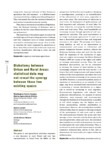Use este identificador para citar ou linkar para este item:
http://www.alice.cnptia.embrapa.br/alice/handle/doc/1018000| Título: | Dichotomy between urban and rural areas: statistical data may not reveal the synergy between these two existing spaces. |
| Autoria: | CAMPOS, W. P.  SILVEIRA, M. A. da   CALIARI, M.   WANDER, A. E.   |
| Afiliação: | WASHINGTON PEREIRA CAMPOS, UFG; MARINA APARECIDA DA SILVEIRA, UFG; MARCIO CALIARI, UFG; ALCIDO ELENOR WANDER, CNPAF. |
| Ano de publicação: | 2015 |
| Referência: | In: INTERNATIONAL CONFERENCE ON AGRICULTURAL STATISTICS, 6., 2013, Rio de Janeiro. Improving statistics for food security, sustainable agriculture, and rural development: linking statistics with decision making: proceedings. Rio de Janeiro: IBGE, 2015. |
| Páginas: | p. 722. |
| Conteúdo: | An analysis of several indicators, socio-economic and environmental, through the Dashboard of Sustainability is possible to tell which category has the highest rate of farmer sustainability, whether smallholders or monoculture. However, the secondary data available in Brazil today does not support a thorough analysis of the participation of each actor and to which the interconnection between the actors and their synergy in local economic activity. Since, given the narrowing between urban and rural, the statistical data available are not able to demonstrate the extent to which gives the rural-urban dichotomy. Thus, it is relevant to point out and discuss ways to provide consistent statistical data and be, in fact, able to demonstrate the local reality of a region within the welfare actors. |
| Thesagro: | Estatística Economia |
| NAL Thesaurus: | Welfare economics Synergism Rural areas |
| Palavras-chave: | Dicotomia Área rural Área urbana |
| ISBN: | 978-85-240-4343-7 |
| Notas: | ICAS 2013. |
| Tipo do material: | Resumo em anais e proceedings |
| Acesso: | openAccess |
| Aparece nas coleções: | Resumo em anais de congresso (CNPAF)  |
Arquivos associados a este item:
| Arquivo | Descrição | Tamanho | Formato | |
|---|---|---|---|---|
| aew2.pdf | 57,61 kB | Adobe PDF |  Visualizar/Abrir |









